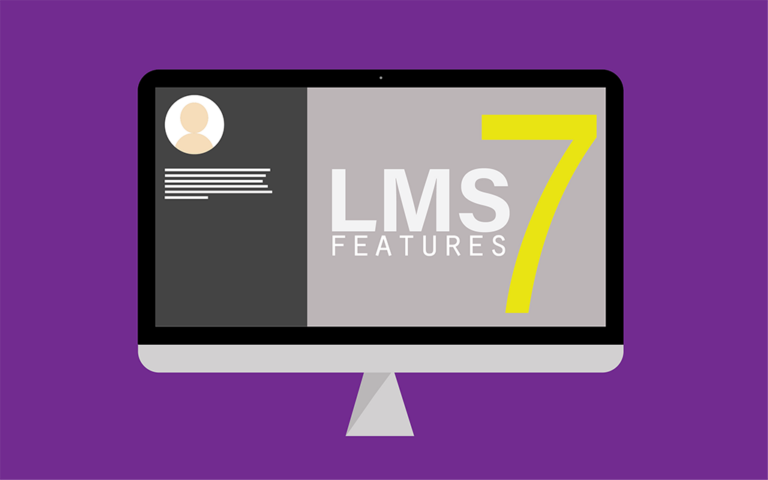The 7 Best Features of a Learning Management System

There are many compelling reasons why implementing a learning management system can directly benefit your business and you may not know exactly how they can have a huge impact. In this blog post, we analyse 7 of best features of an LMS and how they help your business.
- Compliance, Certification, and Auditing
For many companies, the driver behind Implementing an online learning management system (LMS) is to assist with adhering to compliance laws which exist across many industry sectors. These laws state that employees must be trained to a specific industry standard and that proof of learning needs to be provided when auditing time comes around and the inspectors arrive.
The LMS ability to deliver, capture and record training in a centralised database is one of the most compelling LMS features to a business. The system can also be used to provide company policy documents (staff handbook, onboarding, procedure documentation) and online training, whilst also offering advanced certification methods, such as the ability to track individual employee skills and to identify performance gaps.
The fact that the LMS stores individual user records means they can be easily produced in the event of an audit. This will prevent violations and fines as a result of non-compliance and it removes the massive administration costs associated with keeping physical records on file.
2. Comprehensive Reporting and Analytics
Every business needs reporting and KPIs to gauge how successful a training programme is progressing. That’s why it is extremely important to be able to monitor your online training to determine if it’s on target or needs to be adjusted.
Keeping an eye on the following KPIs will help maintain e-learner performance:
- How well are they engaging with the online training content?
- Are they taking the training in a timely fashion?
- Are they receiving all the information they require to achieve the learning objectives or has training stalled?
The above issues can be easily identified using an LMS that has a robust reporting system and analytics suite that allows you to monitor the online training at employee level and across a wider range at a company level.
Using the analytics you can determine what percentage of your workforce has completed their online compliance training course, how long it took to complete the online training on average as well as when and where (in or out of work hours) the training was taken. You can even schedule automated reports to your inbox, so you always have a live view of the status of your training programme.
3. Mobile Responsive Design
The mobile responsive design is essential for an online training platform. It ensures the provision of training modules that offer the best user experience on smartphone, tablet or desktop, giving users (in any location or on any device) the opportunity to easily take the online training programme. It’s an important feature that increases employee engagement to those who prefer to use a smartphone or tablet to access the learning materials.
4. A simplified, Intuitive LMS User Interface (UI)
When choosing an LMS you should consider how easy the system is to use. It’s important to think about the end user experience and also the administrators.
Great user experience ensures buy-in from your employees. It could become an added challenge to get employees to actively engage online training content if the user interface is hard to navigate and not clearly presented.
You also need to be sure that the LMS you select does not present any further challenges to the administrator and that it fits easily with their abilities, skill level, and competency.
As with all IT project implementations, be sure to ‘Request a Demo’ of the LMS software before you decide to buy. Ensure it aligns not only with your training requirements but with your level of user expectation. Include end users in the demonstrations to be sure that both the end user and the administrator are happy with the user experience.
Pro Tip: Have the LMS provider upload some sample training modules and also some of your existing content for a trial period to test the system capabilities.
5. Comprehensive Support & Services
LMS vendors can very often have different service level agreements. Support services depend on whether the LMS they are providing is a system owned by them or if they are a partner/reseller of the software.
In order to determine which option is the correct fit, you will need to know your exact requirements and what level of support will you require. This could be based on your system administrators knowledge or how complex the LMS is to use.
It would be right for you to presume your existing training programme team (who are unfamiliar with LMS) will need more support to configure and deploy the system effectively.
Consider choosing a local vendor who trades in a similar time zone and one who owns the LMS system. As the system creators, they will provide you with the highest level of direct support, unlike resellers who will only provide second-hand support information.
Pro Tip: Buying directly from the source code owner will make the implementation phase extremely smooth allowing you to manage the system with confidence whilst having access to an experienced support team when you need them.
6. Effective Monitoring of eLearning Programmes
As part of your ongoing online training initiative, you will need to re-evaluate your employees periodically to close any knowledge gaps that exist or for re-training where necessary.
This means that your LMS must be comprehensive enough to support a broad scope of eLearning assessment methods. The system should feature built-in tracking monitoring and notifications so you can tell who needs to re-take training over a set time recorded in the user profile.
The system should be programmable and have the capability to send notifications to individual users when compliance training is required to be taken annually, thus automating the whole process.
7. Gamification Features
Gamification can give your employees the extra motivation and sense of achievement they need in the form of badges and certificates. It seems a less important feature of an LMS to have built-in gamification features, but by providing rewards throughout your training programmes as well as accredited certifications, it can be the difference between delivering a successful online training programme or a failed one.
To Conclude…
As the proud owners and providers of our own cloud-hosted LMS solution, these are just some of the features that we consider to be ‘out of the box’ and essential to all online training programmes. You probably won’t even be thinking about the features of an LMS at the early stages of research but we recommend that these are worth considering when choosing an LMS.

